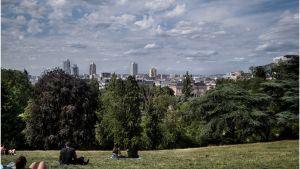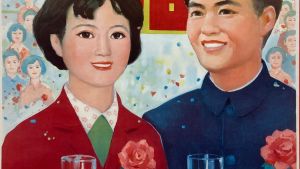
Orwell in the Chinese Classroom
This is the translation of a blog post published on 1 May 2019 by an anonymous Chinese student. For obvious reasons, we were unable to confirm the identity of the writer, but the account resonates with other testimonies from students at Peking University that appeared in the public record or which we have heard personally, so we have decided to make it available to an international audience. After actively joining or simply showing support for the protest staged by the workers at Jasic—a welding equipment factory in south China in July 2018—Marxist students at Peking University (PKU) and other prominent Chinese universities across China were subject to surveillance, discipline, and intimidation from both university officials and the police. In August 2018, Yue Xin, a PKU student who exposed a deadly sexual assault case from years ago at the University and was a leading voice in support of Jasic workers, was arrested in Shenzhen and remains detained to this day. In December 2018, plainclothes police abducted Qiu Zhanxuan, the head of PKU’s Marxist society while he was on his way to commemorate the anniversary of Mao’s birth. The Marxist society was then restructured, replacing the original academic supervisors and students with Party loyalists. On 28 December a dozen students at PKU protested against the reorganisation and were assaulted by security guards. Against all odds, some PKU students persisted in their dissenting activities and planned to mark International Labour Day by working at a factory. The following account details the monitoring, harassment, and physical abuse that some of these students experienced. In our opinion, these facts raise serious moral and political issues for those Western universities that collaborate with academic institutions, such as PKU, that blatantly and unapologetically collude with the Chinese authorities to suppress student activists.
The Editors
Morning of 29 April 2019, Yizhuang Industrial Zone, Beijing.
Five young people disappeared here.
At 8:17am they sent their last message. Within the next half hour, all their phones were turned off.
They were students from the former Marxist student group at Peking University, who had decided to ‘work on a holiday’ in a factory during the May Day break. At eight o’clock in the morning, they had just got off the overnight shift.
What happened to them?

The night before, they had sent a message saying that plainclothes policemen had followed them all the way from Peking University to Yizhuang and notified the supervisors in the factory to ‘keep them under close surveillance’.
Men in plainclothes, stalking, disappearance. A déjà vu.
At the same time, at the Department of Medicine at Peking University, Shen Yuxuan suddenly became unreachable.
The night before, as usual, she and another classmate studied in the fourth classroom of the biochemistry building.
At about 10:30pm, several men appeared at the door of the classroom and took photos of Shen. Then, six or seven ‘teachers’, security guards, and two policemen broke in.
After sending other students away, they stood next to the seat occupied by Shen: ‘Will you come with us or not? Are you coming with us by yourself or do you want me to force you? ”
This request was completely unmotivated, and the two students were unwilling to respond.
Suddenly, a classmate was grabbed by his neck and pulled up from his seat. They held down his arms and dragged him into the police car, where he was punched and kicked. Do you want to call for help? They poured a bottle of water all over his face.
Then the police resorted to the usual means—strangling, covering his mouth, twisting his arms behind his back—and took him to the security office. In a conference room, they used both hard and soft methods to beat, abuse, and mock this classmate until 2am.
In the meantime, Shen Yuxuan sent these messages at 11:30pm:

‘Policemen want to question me. I am in the restroom, they want to kick down the door and break in.’ ‘Ew.’
I really cannot imagine this scene. The only thing I could do that night was wait anxiously.
At 2:20am, Yuxuan regained her freedom. It was said that the attack was related to five classmates who were working in Yizhuang at that time.
‘If you dare to leave school, you will be taken away!’ Yuxuan was warned. Her mother, who had been summoned by the police from her hometown in Shaanxi province, was required to guard her all night in the dormitory building.
After all these twists and turns, everyone heaved a sigh of relief and thought the ordeal was over.
No one foresaw that the same nightmare would occur again the next morning. It began when Yuxuan stopped answering calls. Then her phone was turned off and she became completely unreachable.
Anxious, everyone was anxious.
At 3pm, the students finally got through to her mother’s phone. ‘Yuxuan and I are somewhere in Beijing, we can’t tell you where,’ she said in a secretive tone.
Shen’s mother said: ‘Yuxuan is well.’ But right after that Yuxuan could be heard screaming through the phone: ‘I am not ok. I am under house arrest!’
The students on the phone were shocked and the phone call was hung up before they could ask any questions.
From that moment her phone has been turned off and she has not been heard from since.
This was Peking University on 29 April.
There is no need for consternation. This is not the plot of the novel 1984. It is just a recurrent hidden occurrence in the campus of Peking University, which has finally erupted on this crucially sensitive occasion.
At Peking University today, black is brighter than any other colour and reality is more bizarre than movies.
While students are living a normal student life, attending classes, reviewing, and taking exams on time; some other students are living a completely different life. In this secretive life, there are parents having nervous breakdowns, frequent interrogations, and even sexual harassment of students by university staff. The police are stripping and searching them, and demand these students to give in and admit their mistakes under threat of being expelled or put in handcuffs.
Since last year’s ‘28 December protest’ against the reorganisation of the Marxist student group at Peking University, their voices cannot be heard on campus anymore. Occasionally, people read some phrases like ‘Zhan Zhenzhen was suspended from school’ on the Internet, but there has been no definite news. As far as I know, this kind of ‘being disappeared’ does not mean that these students no longer pay attention to the rights and interests of the workers and have abandoned their criticism as a weapon. On the contrary, it can only point to the unacceptable fact described above. i.e. that students are under unimaginable pressure and restrictions.
On 23 January 2019, after more than 40 hours of police custody and interrogation while in a state of sleep deprivation, Student A was sent home, and her mobile phone, computer, and ID card were confiscated. Her network at home was cut off, her parents’ phones were monitored, and she had to report whenever she went out. In a nutshell, she was cut off from all contact with the outside world. And this was just to lay the groundwork for the ensuing, and more intense ‘ideological and political education’.
The police threatened her saying: ‘You will have to drop out of school and be detained if you do not admit your mistake’. The police also said that ‘You are either from a single-parent family, or sociopaths who are withdrawn, gloomy, and hostile to society’. It was not until the second week after the beginning of the semester that Student A was released from house arrest and allowed to return to school. But she had already missed two required courses, and another similar Student B also missed the make-up exam. When the student tried to discuss the situation and ways forward, a deputy secretary of the Party Committee at the Department of Sociology said: ‘Rather than your studies, cooperating with your school is your first duty.’
After returning to school, a secretary of the Communist Youth League of Peking University kindly reminded Student A: ‘Don’t contact the former Marxist student group, don’t eat with them, they may drug you and you will be brainwashed.’ On the night of 3 April, the same secretary kept asking Student A about the personal life of several female students of the former group, and said that he did not go to the dormitory to find her as he had done on 28 December because he was ‘afraid that some people are too beautiful and he would not be able to control himself’.
This kind of slander and harassment is only the tip of the iceberg. Here is the case of Student C. The police and the student counsellor came to her home together during the winter vacation and told her parents that if the student did not admit her mistake, she would be expelled and detained, which caused the mother to fall on her knees to beg for her daughter. Student C was so upset that she could only comfort her mother and tell her mother that she had done nothing wrong.
In late February, the new semester began. Students thought that this was the end of the matter, but they quickly discovered that what happened in winter vacation was just the appetiser.
Just two or three days after the new semester had begun, a policeman claiming to have been entrusted by the school and by his family came to talk with Student D. He spoke candidly: ‘If you are the ruling class, you must deceive the people’ and ‘if you do not deceive the people, the cost of maintaining stability is too high’. Although such words were already deeply shocking, what the police and university staff did in the next few days was equally creepy:
– A student was detained for up to eight hours at the Yanyuan police station. Several police officers interrogated him in rotation and slapped him until his nose bled.
– A student was asked to read aloud the regulations on subversion and incitement to subversion in the Criminal Law. The police said: ‘This is your crime!’
– After several hours of continuous questioning, A student was forced by two people to write a declaration in which he said: ‘I voluntarily give up all rights to education, voluntarily assume all legal responsibilities.’ Signing this document was his only way out.
– A student was stripped naked, with his upper body bent on the table and police wanted to check his anus to see ‘if there a recording pen in there’.
– A student was threatened by the police: ‘It is the school’s business whether you can go to school or not, but it is our business not to let you go to school.’ They also said: ‘Your parents may lose their jobs because of you.’
– A student was violently dragged by three people from the administration building to the Fifth Science Building for ‘interrogation’ during the class. This violent dragging process lasted for nearly one hour.
…
Do you want to listen to a lecture? Do you want to go back to the dormitory to rest? Do you want to go on to school? Do you want freedom? First of all, you must give up your dignity as a human being, cooperate with the police, admit your mistakes, stop caring about ‘things you shouldn’t care about’, and return to the ‘normal track’. If one is not sorry, their dignity can be trampled, freedom can be restricted, privacy can be violated, ideals can be insulted, and the body can be desecrated. Of course, according to the police, this is still much better than the feeling of being imprisoned.
Perhaps they think this method is not efficient, so the police and the university staff have come up with some clever tactics for ideological warfare. Three students in the School of Physics often receive emails from the secretary of the Party Committee of the college. These emails sometimes are sent to the three people together, sometimes separately, sometimes directly to the whole college (you may have received them too). The contents range from historical and theoretical issues to personal life. They are generally two to three thousand words long, and tightly cling to one core theme: ‘If the State is well, society is well.’ Is sending group emails to all students in the college an abuse of public power of the Party secretary?
At a democratic life meeting of a Party branch for undergraduates, Student E was besieged and called ‘two-faced’. All the Party members of the branch criticised him and failed him on his ‘democratic evaluation’ form. It was 16 against one. This highly-organised attack left Student E speechless, and his conclusion was that he talked too much with workers at the university, which somehow did not conform to his status as a probationary Party member. After the meeting that night, two policemen came to the campus to prevent Student E from returning to the dormitory and interrogated him overnight. Student E tried to escape twice, but he was pressed against the wall and pushed to the ground. Sometime after 2am some students came to see Student E and they heard his cries inside the department building, while the secretary of the undergraduate Party branch guarded the entrance and called the police to try to drive the classmates away. It was not until 3am that Student E was able to leave. The place where the Party conducts its serious organisational activities has also become a stage for some leaders to do whatever through the guise of ‘criticism and self-criticism’!
There are many examples of the situations described above, but what is even more suffocating is the tracking, monitoring, photographing, and harassing in daily life. Some students are warned that they should not use mobile phones in class and that they should study harder (why not say it when they delay the class to interrogate students?). After studying for a few days in the self-study area, some students were surprised to find that the monitoring camera which was originally aimed at the elevator had turned 180 degrees and was watching them. Other students found that the camera at the intersection in front of the express delivery pickup station turned slowly as they walked around the corner, and if they swung back and forth, the camera would also swing (here they are using really advanced face recognition). Even if students just went jogging or to have breakfast in the Agricultural Garden, plainclothes policemen would take photos and send them to parents as evidence that ‘these people are still gathering’.
Two months later, this simmering undercurrent finally gushed out of the ground, which was unexpected but understandable.
The time of the explosion, 29 April, was significant.
Two days later, on 1 May, workers across the country would have their own festival, although most of them could only spend it working overtime.
Five days later, young people across the country, including the teachers and students of Peking University, would welcome their own festival (the ‘May Fourth Youth Day’), which would of course be spent in speeches of celebrations on various news platforms and the ‘Face-to-Face with Ideology and Politics’, TV programme broadcasted by Peking University.
What is the meaning of these two days of significance?
May Day (International Worker’s Day) celebrates the glory of labour. On this day in history, workers around the world united to fight for their rights.
Youth Day praises the awakening of youth. On this day in history, new youth pursuing democracy and science joined hands with workers to establish a new world.
In such great and glorified festivals, young people who actively participate in labour and carry the banner of Marxism in their school are not allowed to exist. This satirical black humour is almost enlightening.
The organised state machine does not care whether its words are true or false, what kind of harm it will cause to the students, and whether its actions are illegal. Stability is valued above all else. Under this logic, the utmost concern is whether the policy implementation is strong, especially on the 100th anniversary of the May Fourth Movement, and to make sure there is no discordant voice.
However, while members of the former Marxist student group at Peking University who have been blacklisted by the institution (there is indeed such a list with more than 30 students on it) are victims of this logic, they are not the only victims.
Everyone can see that the air on the campus today is much colder than a year ago. ‘Face-to-Face with Ideology and Politics’ playing in the canteens seems the strongest sound of this epoch.
There is no need to ask what kind of era this is. The only answer I can provide is, what kind of youth does this era need:
‘I love my wild grass, but I hate the ground decorated with it. The fire runs and rushes underground. Once lava ejects, it will burn up all wild grass and trees, and it never rots.’ (Lu Xun, Wild Grass)
When they see corruption, they will rise up. Even if the road is muddy and dangerous, malicious stray bullets and spewing undercurrents will not destroy them, because their hearts will always be filled with new things.
Translated by Du Yunfei.





